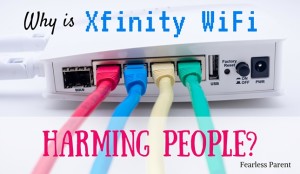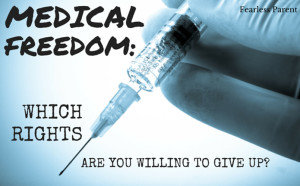In Part 1, we reviewed the ample and robust Constitutional support for religious exemptions. Now that we remember we have a Constitution, let’s look at what it’s protecting us from. And in Part 3, we explore more reasonable steps that can be taken before resorting to the most restrictive and extreme action: the removal of liberty and free choice.
The analogy is forced sterilization
The US Supreme Court has likened vaccines to forced sterilization. Here are a couple of questions to ponder:
- Should female inmates lose their right to become mothers? (Yes, seriously)
- What does sterilization have to do with religious exemptions? (Everything!)
Both issues speak to whether we will allow a government to invade an individual’s body without consent. Both speak to government inserting itself directly into family privacy, an invasion which has resonated through the generations. Both represent the most private parts of an individual’s body, mind, and soul.
“The principle that sustains compulsory vaccination is broad enough to cover cutting the Fallopian tubes.” [Buck vs Bell, 1927]
Not a typo. In one sentence, Jacobson’s vaccine mandate expanded to sanction state-directed sterilization of “unfit” citizens. This opinion is one of the shortest in the history of the US Supreme Court, but was a shot heard round the world. It reignited the eugenics movement in the US. It was cited in Roe v. Wade, to support limiting bodily privacy and autonomy. It defended Nazi war criminals. Before you dismiss the opinion as ancient history or alarmist, check in with California’s female inmates, circa 2010.
We don’t have to wait for a court to expand forced medical treatment beyond this year’s vaccine schedule. The schedule itself is a moving target, and it’s been growing exponentially every year. Mandating the schedule is like writing a blank check.
If only medical treatment was that simple
But these vaccines are safe and effective, right? Of course they’re tested and the data supporting safety is peer reviewed, beyond reproach or scientific debate. If only medical treatment was that simple. And vaccines are the right medical decision for each individual to keep them safe from harm-if only public health were that simple. By the way, would you like to volunteer in a new vaccine trial? How about we just tell you which one you’re signed up for? This isn’t outside of the realm of possibility. The same class of professionals informing government policy on vaccines are openly debating whether people should be forced by government to participate in trials.
I’m not going to tell you that vaccines “work” or “don’t work.” I’m just going to tell you that where there is risk there must be choice.
What other vaccines could be added to the schedule in the coming years? Is your child ready for her anti-addiction vaccine? You may think that your newborn or tween doesn’t need a precautionary vaccine against a behavioral (sexually transmitted) disease that you strongly believe she is not at risk for, but just look to the Hep B and HPV vaccines for a government response.
It is no secret that school vaccination requirements are a gold mine for vaccine manufacturers. The conversation starts even before the vaccines are fully developed and safety-tested. But no one should be surprised about this. Manufacturing vaccines is a business. Business, by design, has a primary responsibility to shareholders to be profitable no matter what is being produced. There are approximately 300 vaccines in development as we speak. How many will be added to the schedule? Manufacturers have good reason to lobby for addition to the schedule, and they’ve been very successful in these efforts.
Further, the “vaccine debate” isn’t only about school children. And we’re not just talking about your children or other people’s children. Take a peek in the mirror and ask yourself, how much do you know about the U.S. National Vaccine Plan or the Adult Immunization Schedule or Healthy People 2020? Adult mandates are here with more on their way. You may already have one at your university or workplace.
Replace “unfit” with “unvaccinated” and see
The aforementioned sterilization case, Buck v. Bell, also contains this gem: “Three generations of imbeciles are enough.” With this opinion, SCOTUS rubber stamped state determinations of whether citizens were “unfit.” It not only allowed, but justified surgery forced by government, on the most private parts of the human bodies, which forever altered bodies, futures, and families.
Who gets to decide what type of risk your child should be exposed to? In the absence of exemptions, the answer is clear. The state is calling the shots.
We know people will be injured by vaccines but we don’t know who nor do we know how many. Courts, legislatures, peer reviewed researchers, and vaccine manufacturers themselves acknowledge vaccines cause injury and death. The Supreme Court of the United States has recognized vaccines as “unavoidably unsafe.” Congress created the National Vaccine Injury Compensation Program to compensate the inevitably injured. Taxes that fund this program were calculated by analyzing anticipated risk of injury so that the fund for paying those injured will be solvent. Public health initiatives are aimed at maximizing a desired outcome in a community, with an acknowledgement that the one-size-fits-all solution will not truly be right for every individual.
Medical exemptions may as well be written in sand
Medical exemptions are not easy to obtain, and could get even harder. Many times, the only way to get an exemption is to already have sustained a vaccine adverse reaction. And not all medical exemptions are permanent. Depending on state law or the “precaution” against a vaccine, the exemption may as well be written in sand. You have to keep going back to the doctor, hoping this won’t be the year you have to play Russian Roulette with an immune system.
Even a valid diagnosis might not be recognized as enough. Courts have disagreed with doctors over whether a medical exemption is valid. Mandates remove decision-making authority from parents and doctors alike, placing individual health decisions in the hands of the state alone.
It’s all business
There are costs in implementation of laws. Regulations have to be amended and red tape hung. In states where the government proposes to vet sincerity of non-medical exemptions, people have to be trained on the government’s idea of true beliefs.
Vaccine advocates argue that vaccines save costs as well as lives. If the claim is correct, we should see overall public health costs decline, right? Let’s look at Mississippi, which boasts an almost 100% childhood vaccination rate. Has Mississippi saved costs overall? It appears not—the state per capita health expenditures have risen at a relatively steady rate over the past couple of decades, just like every other state in the nation. So, overall, vaccines have not decreased costs. Chronic diseases of all sorts are flourishing at alarming rates and we do not have reliable data on whether and how much this could be attributed to vaccines. Perhaps legislatures should look into how to increase vaccine safety data collection and integrity before committing citizens to medical treatments.
Vaccine manufacture is a for-profit business. With a truly captive audience, manufacturers will have no choice but to apply for vaccine research funds and license status, to get on the schedule and sell a product mandated by law. Companies are incessantly trying to convince legislators to give them more financial assistance. I don’t have a crystal ball, but I’d guess that consumers and taxpayers will absorb more costs, by way of higher insurance premiums, and subsidies and credits for vaccine development.
And don’t forget the lawyers. Laws eliminating exemptions to vaccines will inevitably mean more litigation, administrative procedures, private counsel to protect individual and family rights, and petitions to the “Vaccine Court” (which is no court, just an administrative program) for the inevitable increase in vaccine injury.
Beyond a reasonable doubt?
There are times when it could be appropriate for a government to act to preserve the safety of citizens, even against their will. However, such a duty is sacred since some people are overriding the desires and interests of other people. It is a fact that infectious disease has devastated populations in the past. Have we truly and completely answered the question whether vaccines are the right response?
In criminal law, in order for a Defendant to be forced to give up his liberty, a jury of peers must decide that he has done wrong to society beyond any reasonable doubt. Should the standard be any lower when it comes to medical treatment?
In Part 3, we explore more reasonable steps that can be taken before resorting to the most restrictive and extreme action: the removal of liberty and free choice.
 Valerie Borek, Esq has her gloves off on this issue and we are so glad she’s on our team (check out her Fearless Parent Radio co-host page). Valerie has focused her career on empowering parents and strengthening the family. She is proud to be a founding member of the Birth Rights Bar Association. Valerie became involved in birthing rights in 2012 through the encouragement of the midwives that attended her son’s home birth. Check out her blog post here to learn more about what inspired and motivated her to user her legal training to affect positive change in maternity care in the U.S. She lives in Pennsylvania with her partner and their two young boys.
Valerie Borek, Esq has her gloves off on this issue and we are so glad she’s on our team (check out her Fearless Parent Radio co-host page). Valerie has focused her career on empowering parents and strengthening the family. She is proud to be a founding member of the Birth Rights Bar Association. Valerie became involved in birthing rights in 2012 through the encouragement of the midwives that attended her son’s home birth. Check out her blog post here to learn more about what inspired and motivated her to user her legal training to affect positive change in maternity care in the U.S. She lives in Pennsylvania with her partner and their two young boys.













How can we as parents avoid the forced vaccinations and what are our legal rights as a parent who does not want it for their children or themselves? personal beliefs, religion are not an issue any more but is there something else we can use to avoid any vaccines ? flu shots I was told I had to have followed by other injections every 10 years not sure what they are as I didn’t follow this up , but I did have a few flu shots which gave me many side affects which is why I stopped having them, I had my spleen removed due to a Motor vehicle accident, after I investigated myself of the ingredients inside a flu shot I was shocked. I haven’t had the need for having one since in 15 years, I don’t want to be bullied by doctors or big pharma. what are the options if you don’t want to vaccinate at all ?